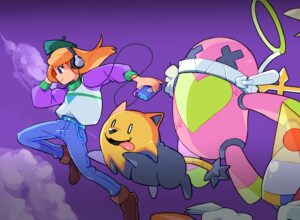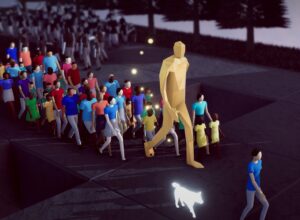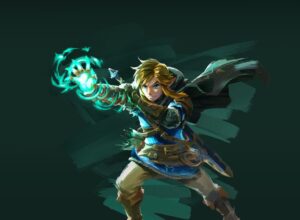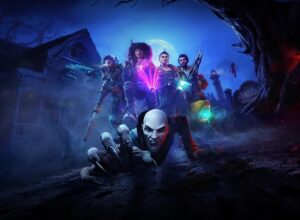Another year in games draws to a spluttering close. The weather is cold; Christmas dinner glows on the horizon; and in these little pockets of time before, between, and after, it’s important to take stock. What kind of year has it been?
2017 ends just as it began: in a cold winter. In January, Masaya Nakamura, the founder of Namco, died at 91 years old. Establishing Namco in 1955, Nakamura leaves behind a coin-op dynasty and one of gaming’s most iconic characters: Pac-Man.
Sony closes Guerrilla Cambridge: creators of side-projects like Killzone: Mercenary and the PSP version of LittleBigPlanet, and of course who can forget 24: The Game. In recent news, one of the studio’s earliest games, MediEvil, is returning to the PS4 in 2018.
At the end of the month Nintendo up-rooted the industry with bold, daring hardware news: the Wii U officially stopped global production. It almost seems as though Shakespeare wrote these lines just for it: “Good night, sweet prince, and flights of angels sing thee to thy rest!”
In February, the industry responded to President Trump’s travel ban with a litany of protests. Sometimes, the frosty present tense in which we reside is warmed a little by good deeds; read Tom’s report on the industry’s response.

Toward the end of the month, Ghost Story Games is officially founded. It’s Bioshock creator Ken Levine’s studio, rising from the ashes of Irrational Games. Just days later, Peter Moore was very much not ‘in the game’ as he stepped down as head of EA Sports. He left the company to become CEO of Liverpool Football Club.
The most tectonic of shifts started in March as GDC kicked off in San Francisco. It made us feel happy and filled our heads with ideas. Could we want for much more? Read Dan’s GDC reports (1, 2, and 3); it’s like borrowing your mate’s notes for a lecture you missed in Video Game University.
Perhaps the most important event of the year came on March 3rd: Nintendo launched the Switch amid a fog of cynicism. There was a gut-punch price tag, a thin line-up of launch games, and underwhelming graphical prowess. In December, it’s fairly easy to see that the Switch’s first year was a success.
The expert bookend placing of two masterpieces (The Legend of Zelda: Breath of the Wild and Super Mario Odyssey); a second tier of brilliant safe bets (Splatoon 2, Mario Kart 8 Deluxe) and refreshing twists (Arms, Mario + Rabbids Kingdom Battle); some solid third-party ports (Skyrim, Doom, L.A. Noire); and an army of interesting indies, has steered the console out of choppy waters and into our hearts.
At the end of the month, Square Enix withdrew from IO Interactive. The silver lining was that IO was allowed to keep the rights to Hitman. Yosuke Matsuda, president and CEO of Square Enix said, “I love the game, and I believe the fans of Hitman think it’s only Hitman if it’s made by IO.” It was down to a question of resources, with Square Enix inking a multi-year partnership with Marvel Studios.
In June, following a management buyout, it was announced that IO Interactive is now independent; we look to the horizon for news of 47’s next assignment.

Of course June brought with it the electronic triple. We dispatched Dan to bring us the breakdown. It was the first year the event was made available to the public, and… it was a little crowded. There were quite a few things: Spider-Man looked good; Dan didn’t get a T-shirt at the Xbox Conference; there were lots of trailers for lots of games; announcements galore from Nintendo, Sony, and Microsoft; and my favourite report from the event, Dan found the loneliest game of the show.
During the summer months there were shuffles and departures. Ubisoft established a new studio in Stockholm. The International 2017, the highest paid eSports tournament ever, was held in KeyArena in Seattle. Raphaël Colantonio, the founder of Arkane Studios left the company. Bruce Straley, the co-director of Uncharted 4 and The Last of Us, leaves Naughty Dog.
In October, things got very spooky indeed. Andrew House, the president and CEO of Sony Interactive Entertainment, leaves the company. Well that’s not so spooky, but on the 17th, people were very scared indeed: the fate of single-player games as we know it hung in the balance and seemed to pull toward the dark side. EA shut down Visceral Games, and cancelled Amy Hennig’s Star Wars game – codenamed Ragtag.
In actual fact, it did not mean that single-player games were over; it actually meant that Visceral were blighted with a very difficult development period for its Star Wars game, and that there were all sorts of internal problems which EA had to tie a rope around. It didn’t help matters that Battlefront II launched to all sorts of cash-grabbing, loot-boxing controversy.

The push toward longer games that continue to make money is an issue that the industry has to think carefully about: games are getting bigger, better, and more intricate, but they haven’t dramatically risen in price since the NES.
At the end of October, Paris Games Week brought us a raft of new trailers, including some particularly dark ones for the likes of The Last of Us Part II and Detroit: Become Human. Ghost of Tsushima looks interesting, and Spelunky 2 is happening.
More corporate Kabuki in the last few weeks as EA also acquired Respawn Entertainment, of Titanfall fame. But it seems that Respawn isn’t worried about EA’s ruthless shuttering track record. And just last week Take-Two founded a new indie subsidiary called Private Division.
Phew, that about brings us up to speed – ah, there is one more thing. Something else happened in 2017, and it happened quite a lot. There were some very, very good games that came out. The eagle-eyed among you will have noticed that we haven’t talked too much about that here. Our Thumbsticks Games of the Year list will be released soon. Until then, let’s reflect on the good and bad of rapturous year and take stock as we move into 2018. This was a good year, 7/10.






